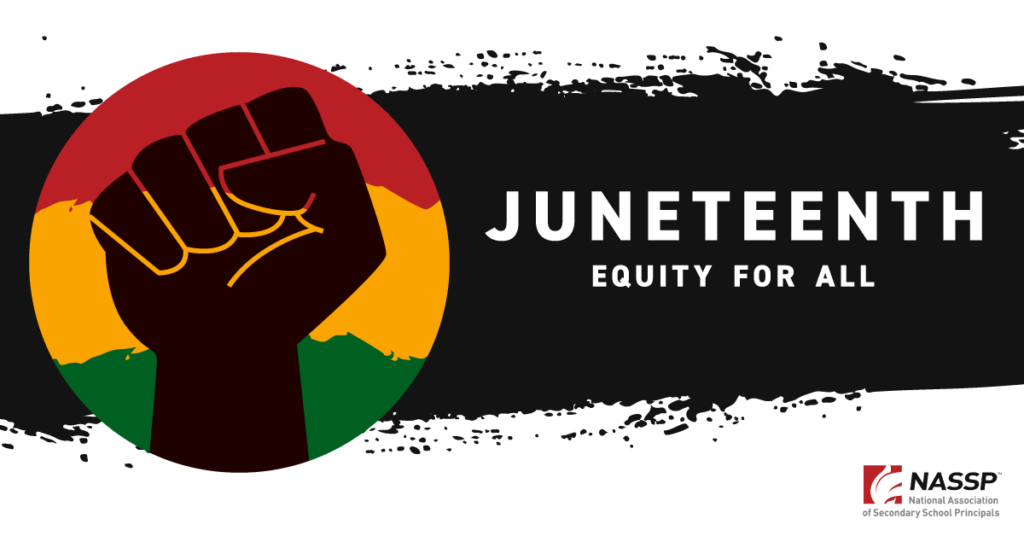As an urban school leader, I know the importance of fostering culturally responsive environments. That’s why I’ve written this post in honor of this Wednesday’s observance of Juneteenth, the newest federal holiday.
On January 1st, 1863, President Abraham Lincoln issued the Emancipation Proclamation to the nation, which declared freedom for enslaved people in Confederate states. However, the news took more than two years to reach enslaved African Americans in Galveston, TX.
Juneteenth, also known as Freedom Day or Emancipation Day, commemorates the significance of June 19th, 1865, when Union troops arrived in Texas and announced the end of slavery for enslaved African Americans in the United States. Juneteenth honors ancestors, recognizes their sacrifices, and celebrates the achievements and contributions of Black Americans. After multiple police killings of Black Americans accompanied by national protest and public outcry, Congress passed The Juneteenth National Independence Day Act in June 2021. Juneteenth education sparks pride in a student’s culture and heritage while empowering educators and students to engage in conversations, advocate for equality, and work towards creating a more just society.
For school leaders seeking ways to increase student and staff knowledge of Juneteenth, I suggest the following:
- Recognize the significance of local history. School leaders can establish partnerships with local institutions such as museums and historical sites that offer resources related to African American history and Juneteenth. Through assemblies, workshops, or classroom discussions, strive to bring awareness to untapped historical narratives and traditions exclusive to the local area. Ideas should include teaching about the historical context, key figures, and the ongoing struggle for racial equality.
- Offer professional development to deepen faculty and staff understanding of Juneteenth and cultural competency. Examples include workshops, seminars, and guest speakers specializing in African American history and social justice. Likewise, develop professional learning communities dedicated to diversity and inclusion practices. Teachers’ acceptance and celebration of students’ lives and rich histories facilitate trust and engagement, positively impacting learning experiences and educational outcomes.
- Promote integration across the curriculum. Interdisciplinary approaches to history are essential. School leaders can encourage interdisciplinary collaboration by integrating historical themes into various subjects. To highlight African American culture and history, explore literature from different periods in English classes; science classes can highlight African American historical development and contributions to scientific theories; and art and music classes can highlight influential African American artists and musicians. Through research and writing, students can discover how holidays become law and the steps creators take to enact laws while simultaneously studying significant historical events. This approach helps students recognize the interconnectedness of knowledge and appreciate history as a multifaceted subject.
- Seek immersive experiences using technology. Multimedia resources, including videos, photographs, and audio recordings, bring to life the voices and experiences of those who lived through Juneteenth. Through these mediums, students can witness the emotions and struggles of the enslaved people as they learn about their emancipation and the celebration of freedom. Providing a virtual experience of walking the paths where events unfolded transports learners to historical sites and deepens their connection to the past. School leaders can support faculty using technological tools to help activate students’ curiosity and deepen their understanding of historical events.
- Hold diversity and inclusion celebrations. History encompasses diverse experiences, and including marginalized voices and underrepresented narratives is imperative. Organize special activities within the school, such as performances, art exhibits, or talent shows to embody African American talent and contributions. Also, consider incorporating similar stories from various cultural backgrounds, races, and socioeconomic statuses. By showcasing diverse historical figures, a leader fosters inclusivity, promotes empathy, and empowers students from all backgrounds.
- Collaborate with families. Celebrate Juneteenth by hosting family-oriented events such as picnics, potlucks, and heritage nights. Collaboration could also involve finding families within the community who have relatives with experience in prominent African American history. For example, some grandparents were alive during the period of integration in schools and the periods of segregation. School leaders need to understand that the history of Black culture is not far removed from what seems so long ago.
Actively embracing and celebrating Juneteenth promotes a positive, holistic, and enriching educational experience for all students to connect with their past, understand their present, and shape their future. This demonstration of social justice and disintegration of structural oppressions within the context of the school setting ignites students to become informed, compassionate, socially conscious, responsible, and engaged citizens. School leaders must take the lead in commemorating historical events impacting culture to provide educational justice for all.


